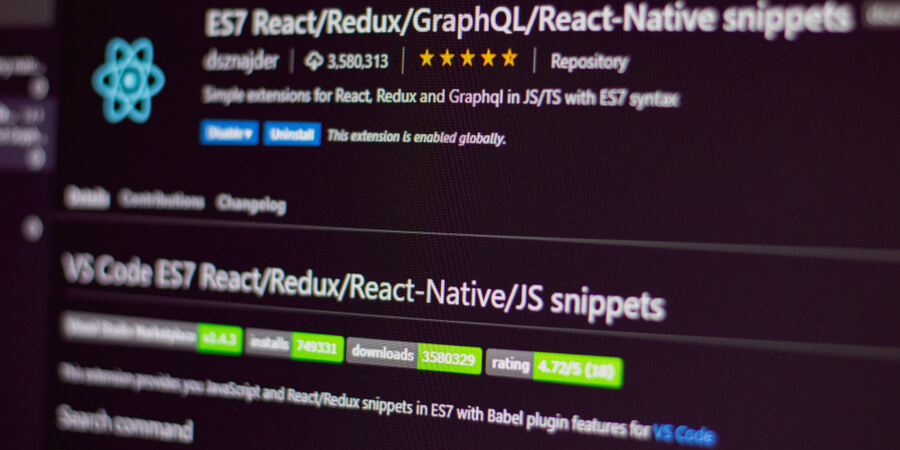Native app development involves the development of apps for a specific platform using specific programming languages, while hybrid apps are developed through a single code base with the capability to run on multiple operating system platforms. And web apps are plain websites that exhibit the interactivity and functionality of native applications. The choice between the best among the 3 is arguable since each one has its pros and cons. All these variants are progressing to offer robust platforms for successful apps that can deliver the best services. This article dives deep into all 3 app development services and throws light on their benefits and shortcomings.
What is Native App Development?
A native app is an application developed to entirely comply with the requirements of a particular operating system, either Android or iOS. Native app development involves building apps uniquely for each OS platform and they work incompatibility with the device features. Native apps can be directly downloaded from the app stores to the mobile device and can be launched without any support from other browsers or tools. A native app’s data is either stored in the gadget’s memory or on the cloud.
Pros of Native Apps
- Smooth functioning with fast operating speed and flawless performance. Since the native app is built for a particular OS, it can take advantage of its processing speed.
- Numerous designs and UX possibilities including state-of-the-art UI/UX design and animation.
- Users can more quickly understand app navigation in a native app’s UI than its hybrid counterpart.
- Native apps seamlessly integrate with the device’s hardware including camera, phone, GPS, and so on.
- They are very easy to launch in the app store.
- Native apps are more secure and reliable.
- It is very easy to implement sophisticated features such as AR, VR, and IoT in native apps compared to hybrid ones.
- Native apps offer developers ready, updated libraries to interact with the OS.
Cons of Native Apps
- The initial investment is high in native app development especially if apps are simultaneously developed for both platforms.
- The maintenance and update costs also go up in proportion to the number of devices supported by the native app.
- You will need a professional team of skilled developers with a vast area of specialization to build and deliver high-quality native app development services.
- Native apps require constant updates to keep updated with the current OS versions.
- Unlike web apps, native apps cannot be accessed from search engines but only after it is downloaded.
- Users of different devices can use different native app versions leading to complicated maintenance.
What is Hybrid app development?
The hybrid app is a category of a cross-platform app that facilitates quick app development and launch with minimum costs. They are the ideal solution for progressive startups due to their high development speed and low priority to UX and performance. Hybrid apps work across platforms, an app created for iOS will also work on Android and vice-versa. The hybrid app is an amalgamation of native and web app with a website at its center and a native app as an external cover.
Pros of Hybrid Apps
- Cost-efficient development can be achieved through ready-made components, frameworks, and modules.
- Due to its compile-once, run-anywhere feature, hybrid apps can reach a wider customer base of Android, iOS, and Windows platforms simultaneously.
- Uniformity in the design of hybrid apps allows users to easily identify app elements and predict navigation on various devices.
- Hybrid apps allow flexible and adaptable creation of UI/UX design.
- Hybrid apps receive growing support from the development community and are easy to maintain.
Cons of Hybrid Apps
- Hybrid apps may face performance issues, such as delays in scrolling, clicking, and so on.
- Hybrid apps may not completely integrate with the devices and their OS.
- They may not be capable of implementing complex features such as charts, diagrams, and in-app analytics.
- Hybrid development frameworks are inflexible and cannot quickly adjust to changing technology.
- Hybrid apps may have potential integration issues concerning storage, settings, and so on.
What is Web App Development?
A web app is an application that offers the experience of a native app and can run on all browsers and devices, including mobile phones, laptops, tablets, and TVs. The only prerequisite for a web app to run is the availability of a browser. With web apps, only a single application needs to be created for several platforms instead of creating many applications.
Pros of Web Apps
- Compatible with multiple platforms. After you build a web application, you can run it on any platform without devoting any extra development time or effort.
- With web apps, users can always access the latest versions of the application, eliminating the need for downloading updates.
- Web apps can be developed using many technologies, giving them the flexibility of better features and functionality.
- It can be built faster, development costs are lower and the development process takes less time.
- It can be accessed easily by users without having to download anything as long as they have the right browser.
Cons of Web Apps
- Has limited access to the platform’s native features such as camera, contacts, storage, and so on.
- Web apps require an internet connection in the form of WIFI or cellular data to be accessed.
- Any change in the web browser can cause issues with the running of a web app.
- Web apps cannot be downloaded from app stores and mobile marketplaces like native and hybrid apps.
- Since web apps are only available on browsers, the UX becomes complex, as the user needs to take several steps to get to the application.
The Final Word
Now that you have understood the pros and cons of native, hybrid, and web app development, you can make your choice depending upon your specific business need. For businesses with a huge budget, a native app is an ideal choice, while if you are a small business or startup, a web app will be the perfect fit. If your company is looking to improve its visibility in the marketplace without going through the hassle of developing 2 separate apps for Android and iOS a hybrid app will be the best choice.
References :
- Types of Mobile Apps – Mobile Web vs Native vs Hybrid App (embitel.com)
- Choosing the Right App for Your Business: Native, Web, or Hybrid? (mobiloud.com)
FAQs on React Native App Development Services
Q. What is React Native app development?
A. React Native is a popular framework for building mobile apps using JavaScript and React. It allows for the development of high-quality, native-like apps for iOS and Android from a single codebase.
Q. How does React Native differ from native app development?
A. Unlike native app development, which uses platform-specific languages (Swift for iOS, Kotlin/Java for Android), React Native uses JavaScript and React, enabling developers to build apps for both platforms simultaneously.
Q. Why choose React Native for mobile app development?
A. React Native offers faster development, cost efficiency, and the ability to create apps with near-native performance, making it a preferred choice for startups and enterprises alike.
Q. Are React Native apps as good as native apps?
A. React Native apps can achieve performance close to native apps and are generally suitable for most types of applications, barring some high-performance or complex graphics requirements.
Q. Can existing web applications be converted to React Native?
A. Yes, if the web application is built using React, it can be relatively easily ported to React Native with some adjustments.
Q. What are the limitations of React Native app development?
A. Some limitations include less support for advanced graphics or gaming, potential issues with device-specific features, and a reliance on third-party libraries.
Q. How is the performance of React Native apps?
A. React Native apps generally perform well and can handle most common app requirements effectively. However, for highly intensive tasks, native development might be more suitable.
Q. Can React Native be used for both iOS and Android app development?
A. Yes, React Native allows developers to create apps for both iOS and Android from a single codebase, with minor platform-specific adjustments.
Q. How cost-effective is React Native app development?
A. React Native can be more cost-effective than native development, as it reduces the need for separate iOS and Android development teams.
Q. How does React Native handle updates and maintenance?
A. React Native’s single codebase approach makes it easier to push updates and maintain apps across both platforms, often leading to quicker turnaround times and reduced maintenance costs.




